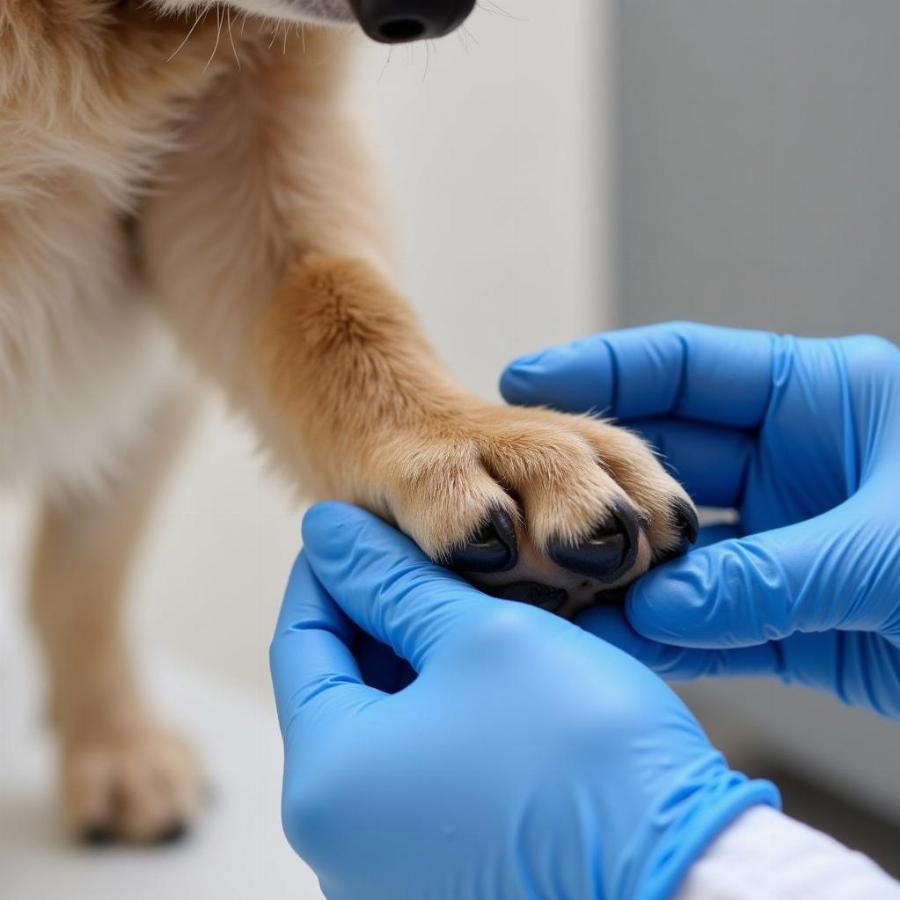Itchy paws are a common problem for dogs, leading to excessive licking, chewing, and scratching. This discomfort can stem from various factors, ranging from allergies to parasites. Understanding the causes, symptoms, and treatments for itchy paws is crucial for any dog owner to provide their furry friend with much-needed relief.
Why Do Dogs Get Itchy Paws?
There’s no single answer to why dogs get itchy paws. It’s often a multifactorial issue, meaning several factors contribute to the problem. Let’s explore some of the most common culprits:
Allergies
Just like humans, dogs can suffer from allergies. These allergies can be triggered by various sources, including:
- Environmental allergens: Pollen, mold, dust mites, and grass are common environmental triggers for itchy paws.
- Food allergies: Some dogs develop allergies to certain ingredients in their food, such as beef, chicken, dairy, or wheat.
- Flea allergy dermatitis: Even a single flea bite can cause intense itching in allergic dogs.
Parasites
Fleas, ticks, and mites can all cause skin irritation and itchiness, particularly in the paw area where your dog walks through grass and other potential hiding spots for these pests.
Infections
Bacterial and yeast infections can thrive in the warm, moist environment between your dog’s paw pads, leading to inflammation, redness, and intense itching.
Dry Skin
Dry skin, often caused by low humidity or underlying medical conditions, can lead to discomfort and itching in dogs.
Recognizing the Signs of Itchy Paws in Dogs
How can you tell if your dog is suffering from itchy paws? Here are some telltale signs:
- Excessive licking and chewing: Dogs often lick and chew at their paws as a way to relieve itching.
- Redness and inflammation: Irritated skin on the paws may appear red and inflamed.
- Hair loss: Constant licking and scratching can lead to hair loss around the paws.
- Sores and scabs: In severe cases, open sores and scabs may develop from constant scratching.
- Odor: Infections can cause a foul odor emanating from the paws.
Diagnosing the Cause of Itchy Paws
If you notice any of the above symptoms, it’s essential to consult your veterinarian. They will conduct a thorough physical examination and may recommend additional tests such as:
- Skin scraping: To check for microscopic mites.
- Fungal culture: To identify a fungal infection.
- Food trials: To pinpoint potential food allergies.
Effective Treatments for Itchy Paws
The treatment for your dog’s itchy paws will depend on the underlying cause. Here are some common treatment options:
Medications
- Antihistamines: To block allergic reactions.
- Antibiotics: To treat bacterial infections.
- Antifungals: To combat yeast and other fungal infections.
- Corticosteroids: To reduce inflammation and itching.
Medicated Shampoos and Dips
Medicated shampoos and dips containing ingredients like chlorhexidine or ketoconazole can help soothe itchy skin and control infections.
 Veterinarian Examining Dog's Paws
Veterinarian Examining Dog's Paws
Parasite Prevention
Regularly using flea and tick preventatives is crucial for protecting your dog from these pesky parasites and the itchiness they can cause.
Dietary Changes
If a food allergy is suspected, your veterinarian may recommend a hypoallergenic diet or a food trial to identify and eliminate the culprit ingredient.
Home Remedies
While it’s crucial to consult your veterinarian for a proper diagnosis and treatment plan, you can also try these home remedies to provide your dog with some relief:
- Cool compresses: Apply a cool, damp cloth to your dog’s paws to soothe itchiness.
- Oatmeal baths: Add colloidal oatmeal to your dog’s bathwater for its soothing properties.
- Apple cider vinegar (diluted): A 50/50 mixture of apple cider vinegar and water can be applied to itchy paws to help neutralize yeast and bacteria.
Preventing Itchy Paws
Prevention is always better than cure. Here are some tips to minimize the chances of your dog experiencing itchy paws:
- Keep your dog’s paws clean: Wipe your dog’s paws after walks to remove potential allergens and irritants.
- Maintain a healthy diet: Feed your dog a high-quality, balanced diet to support their overall skin health.
- Regular grooming: Brush your dog’s coat regularly to prevent mats and tangles, which can trap dirt and debris.
- Address allergies promptly: If you suspect your dog has allergies, work with your veterinarian to identify and manage the triggers.
When to Seek Immediate Veterinary Attention
While itchy paws are common, there are instances where seeking immediate veterinary care is essential. Contact your vet right away if:
- Your dog’s paws are bleeding, swollen, or have a foul odor.
- The itching is severe and interfering with your dog’s sleep or appetite.
- Home remedies haven’t provided any relief within a few days.
Beaut Dogs: Your Partner in Canine Care
Beaut Dogs is your trusted source for all things related to caring for your canine companion. We provide reliable and in-depth information on a wide range of topics, including dog health, nutrition, grooming, and training.
For personalized advice and answers to your dog care questions, contact our experts at [email protected]. We’re here to help you keep your furry friend happy, healthy, and itch-free!